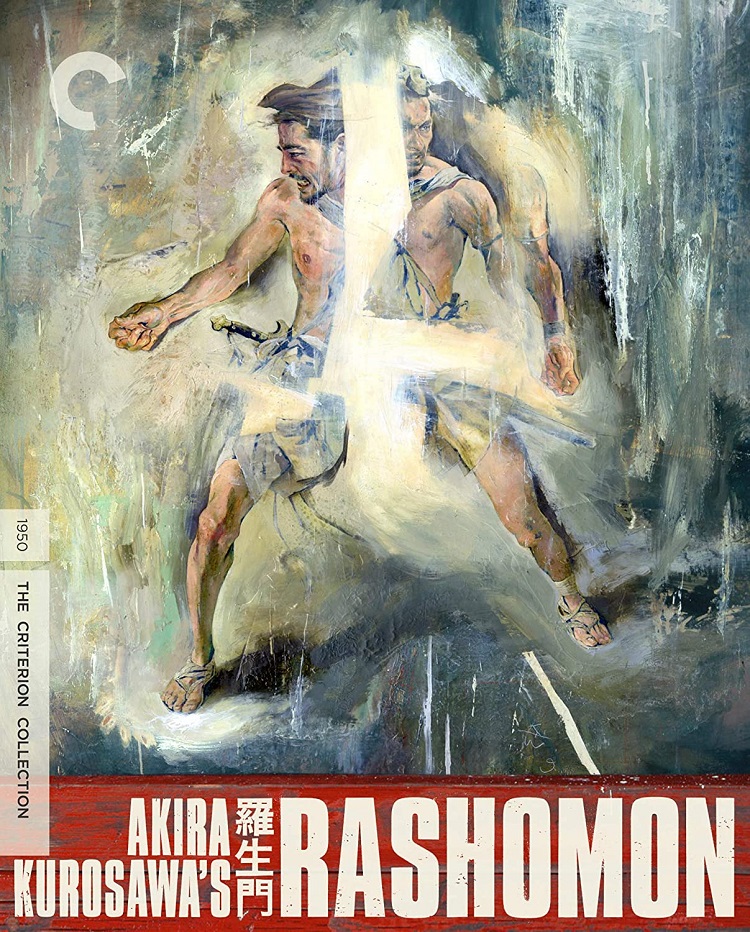
If you’re reading this review, chances are you’re fully familiar with this classic film and just have two questions: how’s the restoration and what are the bonuses? Feel free to skip to the fourth paragraph while I get the obligatory setup and plot summary out of the way.
Esteemed director Akira Kurosawa fully established his presence on the international scene with this impressive and Oscar-winning 1950 film. His go-to leading man Toshiro Mifune did the same, furthering a working relationship between the two that carried through for decades to come. This is a younger Mifune than we’re used to, with the virile, animalistic intensity of a youthful man that hasn’t yet been tempered by the sands of time or growth of wisdom. He brings savage intensity to his role as a bandit and presumed rapist and killer, establishing a fully believable character. As for Kurosawa, there’s good reason this film is considered a classic, as his deft direction of a groundbreaking plot ensures the film will never be forgotten.
That plot involves a murder and rape in the forest that plays out from the perspective of four different witnesses: Mifune’s bandit swordsman, the samurai murder victim, his young wife, and a peasant woodcutter. Each person gives a wildly different account of the crimes, and those perspectives are recounted via filmed flashbacks rather than just spoken testimony, blurring the nature of truth as we struggle to ascertain which, if any, story is accurate. It’s a revolutionary approach to movie narrative construction that has since been borrowed countless times but never as effectively as its origin here. Even after over sixty years, Kurosawa’s masterful film is a stunning delight.
The film was restored in 2008 utilizing a print struck from the original camera negative in the 1960s. While the print was reportedly in good shape, the negative was not, and it shows. Unlike the near-pristine restoration and recent Criterion release of Children of Paradise, Rashomon suffers from persistent scratches, high film grain, and general washed-out image quality. It’s far superior to previous releases, but it’s not the dazzling final product you might expect. The flaws are especially noticeable under the hi-def Blu-ray microscope. While I was somewhat disappointed in the overall quality, I did appreciate the marked improvement, especially the enhanced contrast that lifts the pervasive murkiness of prior releases. Sound quality is far better, assembled and remastered from two different sources to provide the best possible fidelity. On the Blu-ray, the soundtrack is presented in uncompressed monaural and contains barely any hiss or crackle.
Bonus features include a thick booklet stuffed with essays including Kurosawa’s own thoughts on the film, along with segments on the disc of director Robert Altman raving about the film and its influence on his own work, excerpts from a documentary on the film’s cinematographer, an archival audio interview with actor Takashi Shimura, and a feature-length documentary where surviving crew members convened to discuss the film. Frankly, none of the video bonus features were especially enlightening, with only the crew documentary offering some entertaining information. I had more fun just watching the old codgers hanging out than listening to what they had to say, and found that a little bit went a long way. I found the best bonus in the package to be Kurosawa’s own essay, but it’s reprinted from his autobiography so not an exclusive feature of this release.
Rashomon is now available on Criterion Blu-ray and DVD.